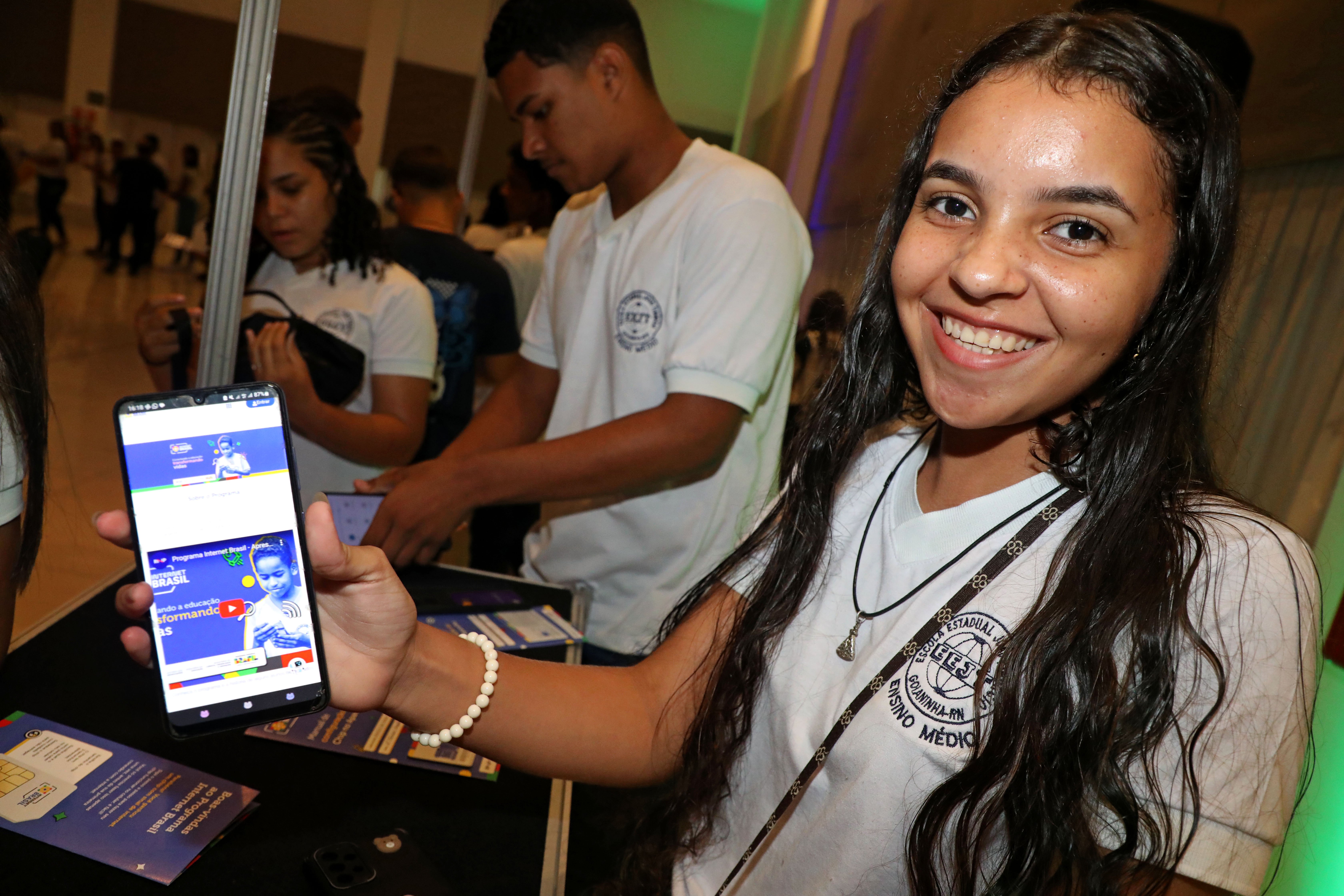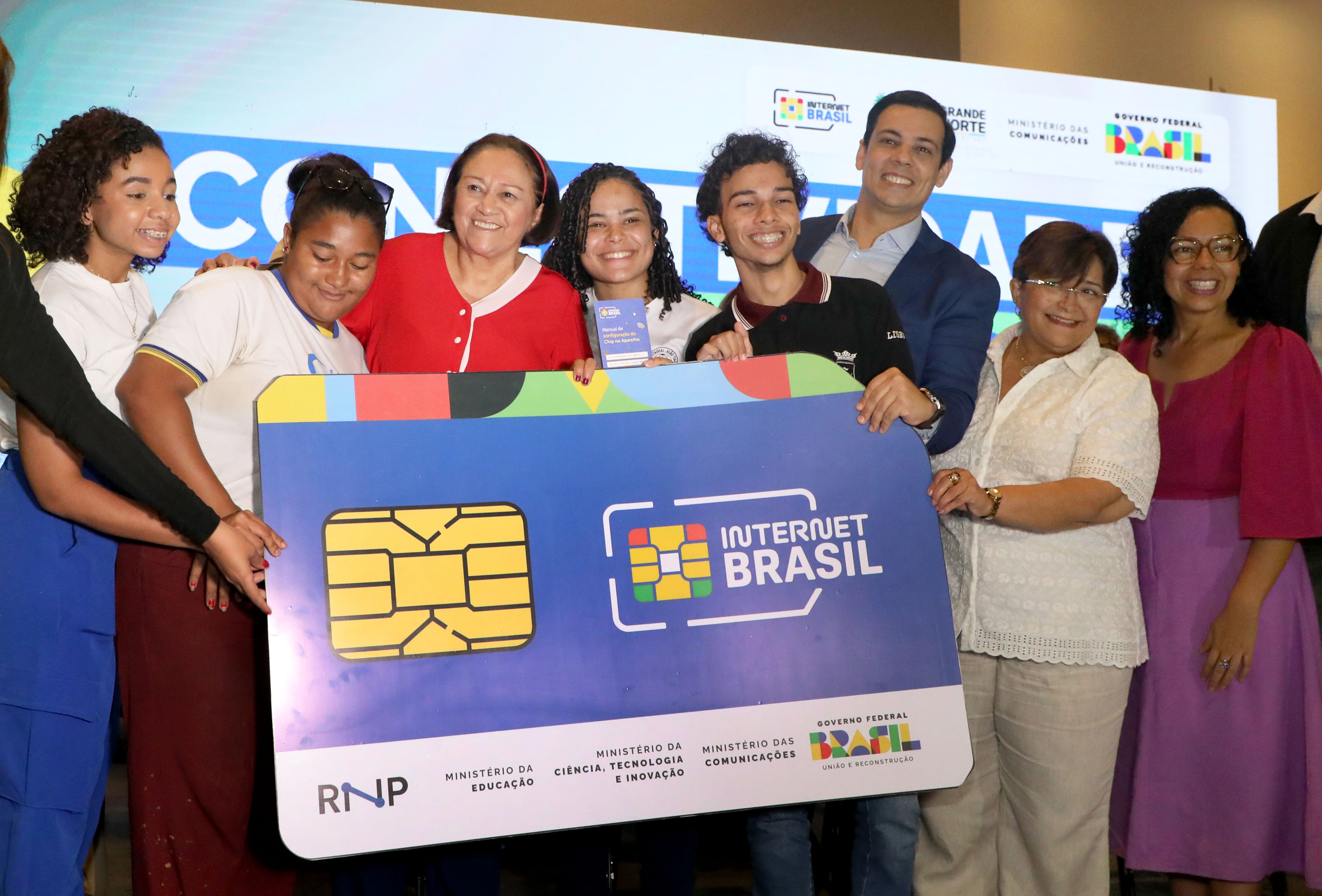Internet Brasil guarantees free mobile internet access to more than seven thousand students in Rio Grande do Norte
Event in Natal brought together students from the state public school system in Rio Grande do Norte, marking the beginning of the distribution of chips in the new phase of the program
Program that has already distributed more than 10 thousand chips since 2022 should reach 100 thousand students in the public school system by the end of the year
Young Isaque Almeida da Silva, 15, gets to know Brazil through the work of great names in popular music. A fan of Luiz Gonzaga, Sivuca and Dominguinhos, he finds inspiration in their songs for his own creations as a musician and poet. “The internet is an important tool for keeping Brazilian culture alive. I intend to use it for my studies at school and in music, accessing online classes and expanding my knowledge”, said the student at the ceremony to hand over chips for the Internet Brasil program, in Natal (RN).
Last Monday (July 8), RNP distributed more than seven thousand internet chips with a monthly data package of 20 GB (gigabytes) to students in Rio Grande do Norte. By the end of the year, 20 thousand students in the state should benefit. Across the country, the number should reach 100 thousand.
An initiative of the Ministry of Communications (MCom) with support from the Ministry of Education (MEC) and execution by RNP, Internet Brasil aims to expand connectivity for students in public schools registered with CadÚnico (registry for federal government social programs).
In addition to Isaque, around 700 young people from state schools attended the award ceremony in Natal. “This initiative is very important for extending educational activities from the classroom to students’ homes. We know that learning does not end in the classroom; it needs to be consolidated later, with access to research mechanisms, to fix and deepen school learning”, said the Secretary of Telecommunications at the Ministry of Communications, Hermano Barros Tercius.
The governor of Rio Grande do Norte, Fátima Bezerra, celebrated the initiative. For her, it will accelerate programs already implemented by the state government. “The delivery of these 20,000 mobile internet chips by the end of the year will be added to programs such as Escola Conectada, which already guarantees Wi-Fi in all 587 schools in the state network. Now, Internet Brasil will further accelerate the digital inclusion of our students”.
Frederica Mendes Ribeiro, 18, was one of the students to receive the “chipão” (big chip) at the ceremony, representing her peers from all over the public school system. She had problems accessing the internet, but believes that from now on it will be easier to do her schoolwork. “I plan to use it to study and do the work that requires research”, she said. “It will also help with communication with family and distant relatives, which is also important”, she recalled.
Students receive the symbolic “chipão” from the hands of the State Governor, Fátima Bezerra, the Secretary of Education, Culture, Sports and Recreation of Rio Grande do Norte, Maria do Socorro da Silva Batista and the Secretary of Telecommunications Hermano Barros Tercius.
The importance of integrating technology with students’ families was also highlighted by educators. While organizing the records of students who picked up their chips at the Castro Alves State School stand, the school’s director, Fábio Luiz de Araújo Pinheiro, stated that connected boys and girls can be agents of change within their families. “In addition to focusing on comprehensive education, this project also aims to foster the social development of these students. The internet ends up being shared with the family to solve everyday problems. Free internet access will be liberating for these young people”, he said.
The students are also celebrating the chance to use the chip to access books, series and films, as a complement to their school learning. An avid reader, Alice will use the mobile internet to read anywhere. “I really like novels. And now I will have access to all the books I want”, she celebrated.
In good spirits, Pedro Henrique Maranhão, 17, will use the chip to study, but admits that he is also excited about the possibility of communicating freely. “It's high quality internet, right? So you can study, but you can also have a girlfriend”, he stated.
The Secretary of Education, Culture, Sports and Recreation of Rio Grande do Norte, Maria do Socorro da Silva Batista, stated that internet access is a priority for the department. "We are in the era of artificial intelligence and schools cannot be left behind”, she said. "And we have created an Educational Technologies coordination department within the Secretariat. Because it is not enough to deliver the chip without also having an educational project”, she added.
Internet Brasil
Since 2022, the Internet Brasil program has distributed more than 10,000 chips with free mobile internet to students registered with CadÚnico. In 2024, the distribution was expanded, with more than 20,000 being delivered to students in Rio Grande do Norte and 150,000 throughout Brazil by the end of the year. The state was included in the Program in March 2024, along with Amapá, Bahia, Pará and Maranhão.
The package offers up to 20 GB of mobile internet data per month. The chips distributed are neutral, which allows you to remotely define the operator to be used, ensuring the best coverage in any region.
Internet access must be controlled by parents, who sign a term of responsibility and authorization for the delivery of the chip. The school, however, participates in the process as a support point. The cell phone must be provided by families, a measure that follows the results of research that shows that a large part of the population already has access to the devices, but not always with guaranteed broad access to the internet.
Internet Brasil is one of the initiatives of the Ministry of Communications to bring internet connection and digital inclusion to low-income families. “Social inclusion is a priority of the Federal Government. And today it is not possible to talk about social inclusion without talking about digital inclusion”, says the Secretary of Telecommunications Hermano Barros Tercius.
*Photos: Fabio Motta

